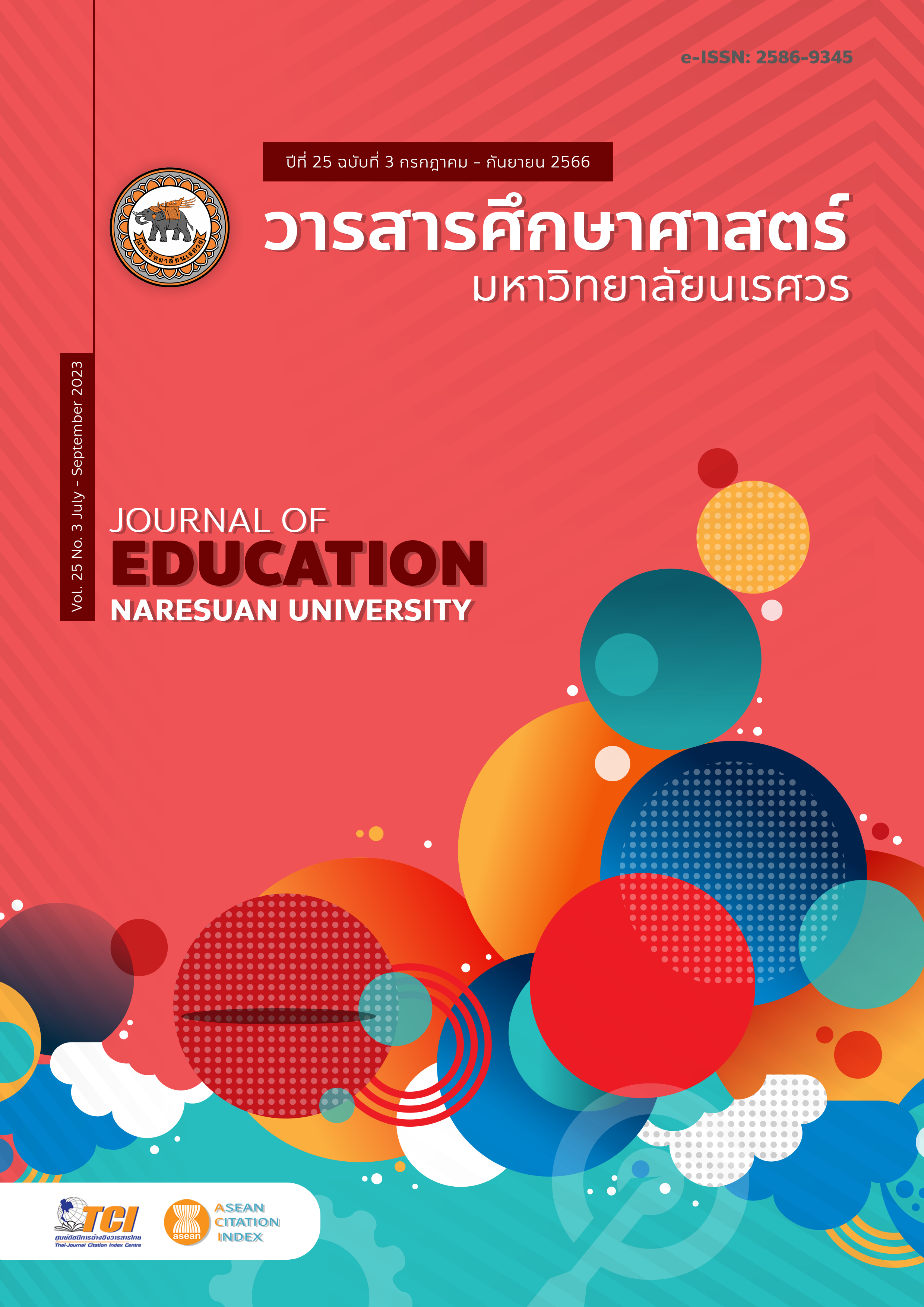A PROFESSIONAL LEARNING COMMUNITY MODEL TO DEVELOP LEARNING MANAGEMENT COMPETENCIES THAT PROMOTE CRITICAL THINKING FOR ELEMENTARY SCHOOL STUDENTS รูปแบบชุมชนการเรียนรู้ทางวิชาชีพเพื่อพัฒนาสมรรถนะการจัดการเรียนรู้ที่ส่งเสริมคุณลักษณะการคิดอย่างมีวิจารณญาณสำหรับนักเรียนระดับประถมศึกษา
Main Article Content
Abstract
This research aimed to 1) develop a professional learning community (PLC) model to develop learning management competencies that promote the critical thinking characteristics of students and 2) to determine the effectiveness of using the professional learning community model. The target group was 25 administrators, and teachers of Ban Sam Yod and Ban Wang Yai School. The research tools consisted of 1) A professional learning community model 2) A pre and post-test 3) writing evaluation form of learning lesson plan 4) ability evaluation form of learning management 5) Teacher satisfaction evaluation form 6) Student behavior evaluation form 7) Student group discussion issues. Using basic statistics are mean, standard deviation, percentage, content analysis and t-test. The research findings were as follows:
1. A PLC model for developing learning management competencies that promote critical thinking traits (PIPPE MODEL) consisted of 5 components 1) principles, 2) objectives, 3) steps, 4) measurement and evaluation, and 5) conditions for the successful implementation of model.
2. The effectiveness of the PIPPE Model was as follows: 1) the teachers' cognition after the model was significantly (p<.01) higher than before the model was used, 2) the teacher’s learning management competencies was the highest level in writing lesson plans and learning management ability at high level, 3) the teachers' s satisfaction towards the model was at the highest level, 4) the students had good critical thinking characteristics, and 5) The students 'opinions on the teachers' learning management found that the content was interesting, had a good learning process, explained in a clear sequence and opened up opportunities engage all students and work.
Article Details

This work is licensed under a Creative Commons Attribution-NonCommercial-NoDerivatives 4.0 International License.
The owner of the article does not copy or violate any of its copyright. If any copyright infringement occurs or prosecution, in any case, the Editorial Board is not involved in all the rights to the owner of the article to be performed.
References
Bonwell, C., & Eison, J. (1991). Active learning: Creating excitement in the classroom. ERIC Clearinghouse on Higher Education Washington DC, ERIC Identifier: ED340272.
Dechagupt, P. (2005). General science teaching method. Bangkok: Office of Academic Quality Development. [in Thai]
Hord, S. M. (1997). Professional learning communities: Communities of continuous inquiry and improvement. Retrieved from http:/www.sedl.org/siss/plccredit.html
Keawnoei, S., Comesorn, S., & Nongyao, A. (2020). Needs education is necessary for development a professional learning community to promote teachers' competence in knowledge management of teachers under the district office Sukhothai Primary Education Area 1. Humanities and Social Sciences Journal of Graduate School, Pibulsongkram Rajabhat University, 14(1), 111-126. [in Thai]
Kitrungruang, P., & Ruiande, W. (2011). The development of teaching models by using case studies teaching science to promote critical thinking abilities of teacher professional students. Silpakorn Education and Research Journal, 3(1-2), 109 – 12. [in Thai]
Khamanee, T. (2019). Teaching science. Bangkok: Chulalongkorn University Press. [in Thai]
Intanam, N. (2010). Comparative development for building a professional learning community in schools (Doctoral dissertation). Bangkok: Chulalongkorn University. [in Thai]
Laonet, N. (U.P.). Develop thinking skills ... is it really difficult? Retrieved January 10, 2019, from http://www.pccpl.ac.th/~sci/techer/25540622inquiry.pdf
Muangcod, M., & Intharaprasit, N. (2011). Development of thinking and reading Abilities Thai language with critical thinking among Mathayomsuksa 5 students using the six-hat thinking method. VASAR Education, 34 (1-2), 146 - 153.
Porntadawit, N. (2016). Learning management: Active learning. Bangkok: Triple Education. [in Thai]
Panich, W. (2012). Learning method for students for 21st century. Bangkok: Tathata Publication. [in Thai]
Panich, W. (2013). Enjoy learning in the 21st century. Bangkok: Sodsri-Saritwong Foundation. [in Thai]
Prasert, C. (2014). Thai studies from the past to the present. Retrieved November 19, 2018, from http://www.chusak.net/index.php?mo=3&art=42067358 [in Thai]
Royal Society. (2013). Royal Society the Royal Academy's Dictionary B.E. 2554 (2011). Bangkok: Office of the Royal Society of Thailand. [in Thai]
Sathongniam, K. (2013). The little scientist house paves the way for Thai children to the future. Retrieved January 20, 2019, from http://www.dailynews.co.th/Content.do?contentId=50718 [in Thai]
Senge, P. M. (1990). The fifth discipline: The art and practice of the learning organization. New York: Doubleday.
Simmons, W., Petty, S., Foley, E., Mishook, J., Lee, J., Trujillo, T., & Catone, K. (2013). The next four years. Rhode Island: Annenberg Institute for School Reform Brown University.
Suthirat, C. (2012). Techniques for using questions to develop thinking (3rd ed.). Bangkok: V Print. [in Thai]
Thampracha, C., & Noi Pracha, S. (2018). Results of learning activities using techniques KWDL in a reversible classroom on the ability to think critically in statistics and data analysis. 6th National Academic Conference on Proactive Learning “How Active Learning Answers Thailand 4.0”. Nakhonsrithammarat: Walailak University. [in Thai]
Wibunthanakun, S. (2020). On the day Thai children lack Critical Thinking. Retrieved February 18, 2020, from https://www.bangkokbiznews.com/blog/detail/649478
Utman, A., & Artin, S. (2012). Development of academic achievement and critical Thinking of the 5th grade students using the 5E learning management model. Journal of Education Science Graduate Study Khon Kaen University, 5(3),162-8.


